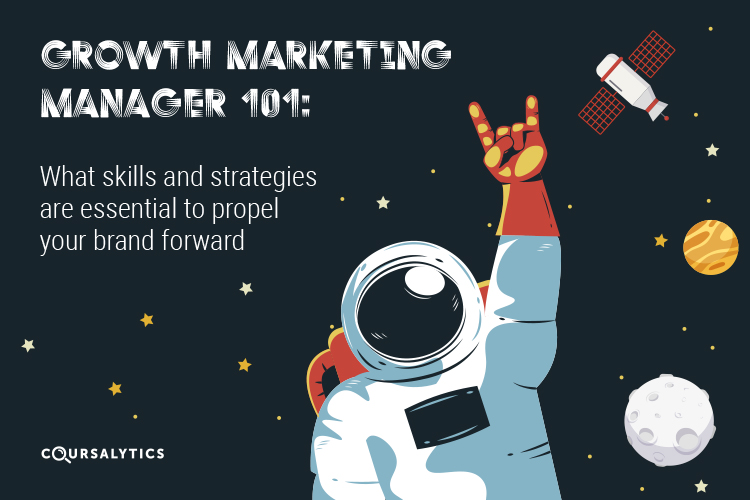Growth Marketing Manager 101: What Skills and Strategies are Essential to Propel Your Brand Forward14 min read
Reading Time: 10 minutesReading Time: 10 minutesGrowing a brand is difficult, period. The marketing field is moving at the speed of light, new tools and strategies pop up every day prompting companies to look for marketers with a holistic skill set that can take care of the entire user journey. This trend has triggered the development of new marketer descriptions like T-shaped or Full-Stack, and new marketing roles such as the Head of Growth, Growth Marketer, Growth Manager, Growth PM, etc.
_____
Table of Contents
- Short History of Growth Marketing
- What is the Role of a Growth Marketing Manager?
- Top 5 Skills of Growth Marketing Managers (Rated 1-10)
- How to Master Growth Marketing Skills?
- How To Implement Growth Marketing in Practice?
- When and Why Should You Hire a Growth Marketing Manager?
________
As of now these roles are mostly observed in tech businesses where a website or application is the primary driver of revenue. The Growth Marketing Manager is almost always a very collaborative role that resides at the intersection of product development and marketing.
“Growth” has also become a controversial word namely because a few individuals and agencies that rebranded themselves as “growth hackers” have abused it. They promise quick tactics for growing users/revenue/followers that are often unscalable, one-off wins, or even worse, end up hurting their clients. There are no silver bullets in growth – it is a steady and gradual process searching for repeatable tactics that optimize all metrics related to customers.
We dive below the surface with this article where our team at Coursalytics interviewed Craig Zingerline – Serial Entrepreneur, Product & Growth Manager, currently Chief Product Officer at Sanboxx – for a deeper insight into what the successful role of a Growth Marketing Manager looks like.
Short History of Growth Marketing
Growing customers and revenue has always been the primary purpose of companies. Today however, those at the top do not have the time and resources to be responsible for maximizing those metrics. That is how the role of the Growth Marketing Manager came to be. It is a multifaceted role, or as Craig puts it “somebody with a lot of expertise across a large variety of digital marketing channels, and someone who likely has product management experience.”
One of the earliest companies to assemble a cross-functional growth team was Pinterest. In the early days they increased new user activation by 20% by running conversion experiments and optimizing the user’s flow on their website. The Facebook example is probably most famous, where the growth team uncovered by digging in their retention data, that when a user connects with at least 10 friends over the first four days after registering, the chances were he/she will stay engaged. With that in mind they developed a number of features and notifications that serve suggestions and reminders, ultimately solving their retention problem and growing to the behemoth they are today.
The knowledge about growth has been massively popularized through marketing communities, education and conferences with the help of leading marketers such as Sean Ellis (Dropbox, LogMeIn) and Brian Balfour (HubSpot).
In the meantime established brands and startups alike are on the hunt for growth marketers. A search on Glassdoor done in Sep, 2019 shows 2.8K jobs. AngelList shows 5.5K startups that have posted jobs for that same search term.
In the past 10 years the idea of growth marketing has really taken hold and it seems it is here to stay.
What is the Role of a Growth Marketing Manager?
The main role of a Growth Marketing Manager has to do with identifying levers across company operations that can deliver massive KPI growth. In other words, as Craig puts it:
“Their key job is to look at every channel, every source, and even every step of the buyer journey or user acquisition funnel and look for areas to grow.”
By cooperating with product engineering teams and marketing/sales professionals, the Growth Marketing Manager sees the whole picture and is in the best position for achieving breakthrough results.
Although considered crucial by many however, the Growth Manager’s role remains widely misunderstood, especially outside Silicon Valley and the tech startup bubble. This is why Craig Zingerline and fellow marketers are dedicated to provide more education in the field and help marketers with the tools and frameworks they need to design and implement a growth function and propel their brands & products forward.
Responsibilities
We asked Craig how growth marketing is different to traditional marketing?
“Growth marketing differs from traditional marketing in a couple of ways, namely, that traditional or digital marketing teams are primarily focused on awareness and getting people over to the app or website whereas growth teams are responsible (along with product managers) for all metrics along the user journey.”
Essentially a Growth Manager function encompasses all stages of the user experience: customer and user acquisition, activation, retention, and up-sell.
Also, the Growth Manager most commonly reports either to the CEO, Chief Growth Officer, Head of Growth, VP of Product, or VP of Marketing. They work cross-functionally with engineering, design, analytics, product management, operations, and marketing to design and execute growth initiatives.
Before he/she executes any such initiatives however, a Growth Manager has to make sure everything important is being tracked and there is an entire data infrastructure in place. Data is pretty much the fuel of a growth engine. With great data available growth marketers can analyse any segment and sub-segment of users and their actions. A great data infrastructure allows to answer deep questions, such as:
- “Which country produced the most new paying users in August?”
- “What are common actions people who became paid subscribers completed during their activation phase?” (Searching for that wow moment!)
- “Can we get a list of users who are paid subscribers for over 2 years so we can run a targeted promotion?”
- “Why don’t users come back after the initial download/registration?”
- “Why aren’t users responding to special offers?”
Growth Managers are responsible for the analytics stack and can build a custom tracking & testing system or work with a selection of third-party tools such as Google Analytics, Mixpanel, Optimizely, etc. Sometimes Growth Managers will build very insightful dashboards for their teams and superiors, so they can quickly see KPIs and important user data in one place.
With the right data available, a Growth Manager sees at which stage potential customers are dropping off at the highest rate. Perhaps fixing/optimizing a small part of the user experience can unlock massive growth – that is the concept of levers and leverage. Then he/she selects a target metric to try and improve. For example, should resources go to acquiring new users or to improving engagement and retention? Most probably the second because there is no point in flooding with traffic which doesn’t convert and stay engaged.
The work of a Growth Marketing Management is organized into tests. With a clearly defined target metric/objective to grow, and a prioritized backlog of ideas to test, he/she begins executing these tests. If the test is to be performed inside the product, the Growth Manager must collaborate with an agile development team for example to implement the changes.
Our team at Coursalytics looked at one of the latest offers for Facebook Growth Marketing Manager and here is a snapshot of the responsibilities:
Product Leadership Responsibilities
- Lead the ideation and execution of product changes that drive growth, partnering with Product Management, Engineering, Design, Content Strategy and Data Science
- Establish shared vision across the company for growth product optimizations by building consensus on priorities leading to major product improvements
- Define and analyze metrics that inform the success of products
- Communicate details, updates and implementations across all stakeholders and teams with extreme attention to detail
- Communicates and simplifies concepts to the audience’s needs
Analytical Responsibilities:
- Apply your expertise in quantitative analysis, data mining, and the presentation of data to see beyond the numbers and understand how our users interact with both our consumer and business products, identify growth opportunities, and execute on projects to drive growth and engagement
Product Growth Analysis:
- Understanding ecosystems, user behaviors, and long-term trends
- Identifying new levers to help move key metrics
- Proposing what to build in the product roadmap
Data Driven Leadership:
- Influencing product teams through presentation of data-based recommendations
- Communicating state of business, experiment results, etc. to product teams
- Spreading best practices for growth with product teams to drive impact
Product Marketing Responsibilities:
- Understand the competitive landscape of products and Facebook’s relative position to inform the product growth strategy and design
- Plan and lead cross-functional efforts to take known product optimizations and implement them in other places
- Lead marketing efforts partnering with Product teams, to effectively promote high retention experiences globally
- Drive multiple projects from strategy to execution in a fast-paced environment in an organized way
- Work on offsite marketing channels like SEO, SEM, and email with product teams to grow acquisition and improve retention by reaching people when they do not yet have an account, or to bring people back
Top 5 Skills of Growth Marketing Managers (Rated 1-10)
We asked Craig to give us a list of the most important skills growth marketers should master for their day to day activities. Here is what he tells us:
- Critical thinking needs to be at or near a 10. You’ll need to work with a cross functional team and will likely be resource constrained and under a lot of pressure to grow. Because of this, you’ll need to take in large amounts of data from multiple inputs (founders, users, engineers, PMs, the market, acquisition sources, costs, etc.) and distill that down into a clear vision and plan.
- Product skills. Understanding of how to activate users along the user journey and to get them to the next stage in the funnel is a critical aspect of growth marketing. If you can’t get people to take your intended actions, then you’ll fail. A lot of this foundation starts with having product skills that enable you to think about how to develop the playbook to drive activation. This skill needs to be around an 8 or 9.
- Acquisition skills. This may be a 10 if you are responsible for marketing, or it may be a 5 or 6 if you’re not. You’ll need to think about how content marketing, paid acquisition, organic growth like SEO, and partnership/affiliate marketing all play a role in growth. It’s highly likely you’ll at a minimum intersect with what marketing is doing, and help drive acquisition.
- Experimentation. If you haven’t done much experimentation then don’t worry – you can learn. But eventually you’ll want to be an expert – 7 or 8 on the scale. You cannot be a perfectionist and expect things to always work with growth marketing. In fact, much of what you will work on will fail. To excel as a growth marketer, you need to be hypothesis driven and growth minded. You need to look at most aspects of growth through an experimentation lens. And once something works, then you double down.
- Prioritization. You’ll need to be ruthless about prioritization of experiments while also running multiple simultaneous efforts across the growth marketing spectrum in order to succeed. You’ll need a system for prioritization, and will become an expert at sussing out what to do when. This skill will be developed over time, so starting as a 3 or 4 and working up to a 6 or 7 will be key.
How to Master Growth Marketing Skills?
Besides dabbling with tools and tactics, what can a Growth Marketing Manager do to improve his growth mentality, creativity and process?
- Conversations
Talk to everyone: colleagues from different departments, users, growth experts in other companies and mentors. Try to understand some of their approaches to tasks and challenges. Figuring out their thought process will immensely help your daily initiatives and reaching your goals.
- Take courses and attend workshops
Attending Meetups, conferences, online and offline courses, there are many outlets that offer education and help for Growth Marketing Managers. We already mentioned some fantastic online courses such as Reforge by Brian Balfour and the Growth Master Training Course by Sean Ellis.
If you are interested in an in-person course and are based somewhere on the East coast (or are willing to travel), Craig Zingerline and his colleague Fabian Geryhalter – renowned brand strategist, are putting on a 1-day Masterclass that will teach you everything you need to validate your brand and growth strategy within hours. Check out the “1020 Workshop: the Exclusive Brand & Growth Marketing Intensive” course page for details, dates and pricing.
- Side hustle
Why not create your own web store or service offering and try to get customers to it in your spare time. This will keep your mind fresh and open thinking about user pain points, solutions and building funnels to your product or service.
- Walk the talk
Dig through data, find patterns and try to answer important questions about your business. Follow the thread wherever it leads you and learn new skills along the way. To truly master growth you will need to get down to work and start iterating.
How To Implement Growth Marketing in Practice?
It is fundamental for a Growth Marketing Manager to have an overall growth strategy and process in place in order to deliver shining results.
We turn to Craig, who explains there are 8 primary steps to running a great growth organization:
- Define your foundations of growth. Look at what growth means to your company, and get the basic growth tools in place.
- Build a Growth framework and your basic strategy and plan from which to grow on.
- Put an Organic growth (referrals, SEO, content marketing) plan together.
- Put a Paid Acquisition growth plan together.
- Put an activation and intent plan together.
- Do a deep dive on retention, including goals for retention.
- Build your initial experiments.
- Work on a growth roadmapping session with your founder(s) or product manager.
From that point onward fast growth is all about fast learning, or in other words trying to get more experiments done within a limited time frame.
Want to start reading and learning about growth strategy right now? Here is an incredible selection of resources by Craig compiled over the years that will get you started off on the right foot.
When and Why Should You Hire a Growth Marketing Manager?
Is the Growth Marketing Manager role necessary for every organization as the Harvard Business Review claims for example? Arguably, it is not ideal for every stage of a company’s lifecycle. We ask Craig to expand more on this:
“Growth works best for companies who have reached some sense of product market fit. Before that point, trying to accelerate growth is likely a waste of time. You’ll need to have a steady stream of users and a few ideas on areas you think you can scale up your growth initiatives. If you are just starting out, figure out how you get some traction before investing in the growth person or team.
Assuming you have product market fit, if you are a founder or part of a small startup and you have no marketing team yet, start with a growth marketer and build around them. If you have a small marketing team but are mostly focused on acquisition, hire a growth marketer to augment what they are doing.”
The fact is growth means scale and there is no reason to scale something that has no market yet. Figure out a desirable product/service, then look to hire growth professionals.
Conclusion – The Future of Growth Marketing
With everything revealed so far, is the Growth Marketing Manager to become ubiquitous in the near future? Is it going to replace traditional marketing roles? Or is it going to be only a distinct branch of specific types of companies? No one knows the future but we turn to Craig yet another time to try and get an insider’s view on the matter:
“I think growth marketing is the future of marketing, and it’s deeply connected to both product management and engineering. In fact, most traditional growth teams are composed of a product manager, engineer(s), growth marketer, and maybe a designer. This is a growing field that will continue to upend traditional marketing, especially as more and more channel saturation happens and companies need to get ever more creative in their customer acquisition and activation strategies. Therefore, I believe you’ll see more and more growth marketers and growth managers outside of San Francisco and Silicon Valley. This is already true in cities like LA, Boston, Washington DC, and international cities like Berlin, Paris, London and more. It’s a great time to be in this role!”
Thank you for reading! What do you, our reader, personally think about the future of Growth Marketing?
Please share in the comments below.



.jpg)


